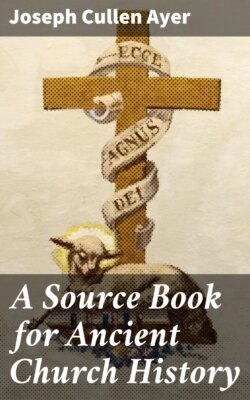Читать книгу A Source Book for Ancient Church History - Joseph Cullen Ayer - Страница 85
На сайте Литреса книга снята с продажи.
(b) Clement of Alexandria, Strom., IV, 12. (MSG, 8:1289.)
ОглавлениеBasilides taught the transmigration of souls as an explanation of human suffering. Cf. Origen in Ep. ad Rom., V: “I [Paul], he says, died [Rom. 7:9], for now sin began to be reckoned unto me. But Basilides, not noticing that these things ought to be understood of the natural law, according to impious and foolish fables turns this apostolic saying into the Pythagorean dogma, that is, attempts to prove from this word of the Apostle that souls are transferred from one body to another. For he says that the Apostle has said, ‘I lived without any law’—i.e., before I came into the body I lived in that sort of body which is not under the law, i.e., of beasts and birds.”
Basilides, in the twenty-third book of the Exegetics, respecting those that are punished by martyrdom, expresses himself in the following language: “For I say this, Whosoever fall under the afflictions mentioned, in consequence of unconsciously transgressing in other matters, are brought to this good end by the kindness of Him who brings about all things, though they are accused on other grounds; so that they may not suffer as condemned for what are acknowledged to be iniquities, nor reproached as the adulterer or the murderer, but because they are Christians; which will console them, so that they do not appear to suffer. And if one who has not sinned at all incur suffering (a rare case), yet even he will not suffer aught through the machinations of power, but will suffer as the child which seems not to have sinned would suffer.” Then further on he adds: “As, then, the child which has not sinned before, nor actually committed sin, but has in itself that which committed sin, when subjected [pg 085] to suffering is benefited, reaping the advantage of many difficulties; so, also, although a perfect man may not have sinned in act, and yet endures afflictions, he suffers similarly with the child. Having within him the sinful principle, but not embracing the opportunity of committing sin, he does not sin; so that it is to be reckoned to him as not having sinned. For as he who wishes to commit adultery is an adulterer, although he fails to commit adultery, and he who wishes to commit murder is a murderer, although he is unable to kill; so, also, if I see the man without sin, whom I refer to, suffering, though he have done nothing bad, I should call him bad on account of the wish to sin. For I will affirm anything rather than call Providence evil.” Then, in continuation, he says expressly concerning the Lord, as concerning man: “If, then, passing from all these observations, you were to proceed to put me to shame by saying, perchance impersonating certain parties, This man has then sinned, for this man has suffered; if you permit, I will say, He has not sinned, but was like a child suffering. If you insist more urgently, I would say, That the man you name is man, but God is righteous, ‘for no one is pure,’ as one said, ‘from pollution.’ ” But the hypothesis of Basilides says that the soul, having sinned before in another life, endures punishment in this—the elect soul with honor by martyrdom, the other purged by appropriate punishment.
